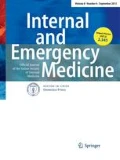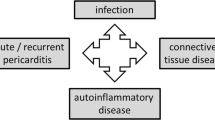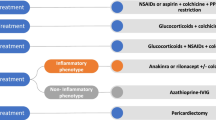Abstract
In developed countries, more than 80% of cases of acute pericarditis remain without an established diagnosis after a conventional and standard diagnostic approach. These cases are generally labelled as ‘idiopathic’, i.e. without a known cause. This lack of information is a matter of concern for both patients and clinicians. Some years ago, this term reflected the state of the art of scientific knowledge on the topic. Advances have changed this point of view, in light of available molecular techniques like polymerase chain reaction able to identify viral cardiotropic agents in pericardial fluid and biopsies. Furthermore, the remarkable efficacy of interleukin-1 antagonists, a therapy targeting the innate immune response, suggests clinical and pathogenic similarity between a proportion of patients with idiopathic recurrent pericarditis and classical autoinflammatory diseases. So, it seems useful to discuss the pros and cons of using the term “idiopathic” in light of the new knowledge.

Similar content being viewed by others
References
Adler Y, Charron P, Imazio M, ESC Scientific Document Group et al (2015) ESC Guidelines for the diagnosis and management of pericardial diseases: the task force for the diagnosis and management of pericardial diseases of the European Society of Cardiology (ESC) Endorsed by: The European Association for Cardio-Thoracic Surgery (EACTS). Eur Heart J 36:2921–2964. https://doi.org/10.1093/eurheartj/ehv318
Cremer PC, Kumar A, Kontzias A et al (2016) Complicated pericarditis: understanding risk factors and pathophysiology to inform imaging and treatment. J Am Coll Cardiol 68:2311–2328. https://doi.org/10.1016/j.jacc.2016.07.785
Xu B, Harb SC, Cremer PC (2017) New insights into pericarditis: mechanisms of injury and therapeutic targets. Curr Cardiol Rep. https://doi.org/10.1007/s11886-017-0866-6
Imazio M, Belli R, Brucato A et al (2014) Efficacy and safety of colchicine for treatment of multiple recurrences of pericarditis (CORP-2): a multicentre, double-blind, placebo-controlled, randomized trial. Lancet 383:2232–2237
Lazaros G, Imazio M, Brucato A et al (2016) Anakinra: an emerging option for refractory idiopathic recurrent pericarditis: a systematic review of published evidence. J Cardiovasc Med (Hagerstown) 17:256–262. https://doi.org/10.2459/JCM.0000000000000266
Brucato A, Emmi G, Cantarini L et al (2018) Management of idiopathic recurrent pericarditis in adults and in children: a role for IL-1 receptor antagonism. Intern Emerg Med. https://doi.org/10.1007/s11739-018-1842-x
Vitale A, Insalaco A, Sfriso P et al (2016) A snapshot on the on-label and off-label use of the interleukin-1 inhibitors in Italy among rheumatologists and pediatric rheumatologists: a nationwide multi-center retrospective observational study. Front Pharmacol 7:380 (eCollection 2016)
Maisch B, Rupp H, Ristic A et al (2013) Pericardioscopy and epi- and pericardial biopsy—a new window to the heart improving etiological diagnoses and permitting targeted intrapericardial therapy. Heart Fail Rev 18:317–328. https://doi.org/10.1007/s10741-013-9382-y
Van Kempen TS, Wenink MH, Leijten EFA, Radstake TR, Boes M (2015) Perception of self: distinguishing autoimmunity from autoinflammation. Nat Rev Rheumatol 11:483–492. https://doi.org/10.1038/nrrheum.2015.60
Muruve DA, Petrilli V, Zaiss AK et al (2008) The inflammasome recognizes cytosolic microbial and host DNA and triggers an innate immune response. Nature 452:103–107. https://doi.org/10.1038/nature06664
Park H, Bourla AB, Kastner DL, Colbert RA, Siegel RM (2012) Lighting the fires within: the cell biology of autoinflammatory diseases. Nat Rev Immunol 12:570–580. https://doi.org/10.1038/nri3261
Rigante D, Lopalco G, Vitale A et al (2014) Untangling the web of systemic autoinflammatory diseases. Mediat Inflamm 2014:948154. https://doi.org/10.1155/2014/948154 (Epub 2014 Jul 15)
Ozen S, Demirkaya E, Amaryan G et al (2014) For the Paediatric Rheumatology International Trials Organisation (PRINTO), Eurofever Project. Results from a multicenter international registry of familial Mediterranean fever: impact of environment on the expression of a monogenic disease in children. Ann Rheum Dis 73:662–667. https://doi.org/10.1136/annrheumdis-2012-202708
Cantarini L, Vitale A, Lucherini OM et al (2015) The labyrinth of autoinflammatory disorders: a snapshot on the activity of a third-level center in Italy. Clin Rheumatol 34:17–28. https://doi.org/10.1007/s10067-014-2721-0
Rodriguez de la Serna A, Guindo Soldevila J, Marti Claramunt V, Bayés de Luna A (1987) Colchicine for recurrent pericarditis. Lancet 2:1517
Verma S, Eikelboom JW, Nidorf SM et al (2015) Colchicine in cardiac disease: a systematic review and meta-analysis of randomized controlled trials. BMC Cardiovasc Disord 15:96. https://doi.org/10.1186/s12872-015-0068-3
Martinon F, Petrilli V, Mayor A, Tardivel A, Tschopp J (2006) Gout-associated uric acid crystals activate the NALP3 inflammasome. Nature 440:237–241. https://doi.org/10.1038/nature04516
Brucato A, Imazio M, Gattorno M et al (2016) Effect of Anakinra on recurrent pericarditis among patients with colchicine resistance and corticosteroid dependence: the AIRTRIP randomized clinical trial. JAMA 316:1906–1912. https://doi.org/10.1001/jama.2016.15826
Caforio AL, Brucato A, Imazio M et al (2010) Anti-heart and anti-intercalated disk autoantibodies: evidence for autoimmunity in idiopathic recurrent acute pericarditis. Heart 96:779–784. https://doi.org/10.1136/hrt.2009.187138
Caforio AL, Adler Y, Agostini C et al (2017) Diagnosis and management of myocardial involvement in systemic immune-mediated diseases: a position statement of the European Society of Cardiology Working Group on Myocardial and Pericardial Disease. Eur Heart J 38:2649–2662. https://doi.org/10.1093/eurheartj/ehx321
Imazio M, Cecchi E, Demichelis B et al (2007) Indicators of poor prognosis of acute pericarditis. Circulation 115:2739–2744. https://doi.org/10.1161/CIRCULATIONAHA.106.662114
Fardman A, Charron P, Imazio M, Adler Y (2016) European guidelines on pericardial diseases: a focused review of novel aspects. Curr Cardiol Rep 18:46. https://doi.org/10.1007/s11886-016-0721-1
Gouriet F, Levy PY, Casalta JP et al (2015) Etiology of pericarditis in a prospective cohort of 1162 cases. Am J Med 128:784. https://doi.org/10.1016/j.amjmed.2015.01.040
Lotan D, Wasserstrum Y, Fardman A, Kogan M, Adler Y (2016) Usefulness of novel immunotherapeutic strategies for idiopathic recurrent pericarditis. Am J Cardiol 117:861–866. https://doi.org/10.1016/j.amjcard.2015.12.012
Brucato A, Maisch B, Valenti A (2017) Acute and recurrent pericarditis. Still idiopathic? J Am Coll Cardiol 69:2775–2776. https://doi.org/10.1016/j.jacc.2017.02.072
Brucato A, Brambilla G, Adler Y, Spodick DH, Canesi B (2006) Therapy for recurrent acute pericarditis: a rheumatological solution? Clin Exp Rheumatol 24:45–50
Imazio M, Brucato A, Cumetti D et al (2008) Corticosteroids for recurrent pericarditis: high versus low doses: a nonrandomized observation. Circulation 118:667–671. https://doi.org/10.1161/CIRCULATIONAHA.107.761064
Brucato A, Brambilla G (2005) Recurrent idiopathic pericarditis: familial occurrence. Int J Cardiol 102:529. https://doi.org/10.1016/j.ijcard.2004.06.012
Imazio M, Brucato A, Doria A et al (2009) Antinuclear antibodies in recurrent idiopathic pericarditis: prevalence and clinical significance. Int J Cardiol 136:289–293. https://doi.org/10.1016/j.ijcard.2008.05.020
Imazio M, Brucato A, Pluymaekers N et al (2016) Recurrent pericarditis in children and adolescents: a multicentre cohort study. J Cardiovasc Med Hagerstown Md 17:707–712. https://doi.org/10.2459/jcm.0000000000000300
Picco P, Brisca G, Traverso F, Loy A, Gattorno M, Martini A (2009) Successful treatment of idiopathic recurrent pericarditis in children with interleukin-1beta receptor antagonist (anakinra): an unrecognized autoinflammatory disease? Arthritis Rheum 60:264–268. https://doi.org/10.1002/art.24174
Brucato A, Shinar Y, Brambilla G et al (2005) Idiopathic recurrent acute pericarditis: familial Mediterranean fever mutations and disease evolution in a large cohort of Caucasian patients. Lupus 14:670–674. https://doi.org/10.1191/0961203305lu2197oa
Cantarini L, Lucherini OM, Brucato A et al (2012) Clues to detect tumor necrosis factor receptor-associated periodic syndrome (TRAPS) among patients with idiopathic recurrent acute pericarditis: results of a multicentre study. Clin Res Cardiol 101:525–531. https://doi.org/10.1007/s00392-012-0422-8
Emmi G, Urban ML, Imazio M et al (2018) Use of interleukin-1 blockers in pericardial and cardiovascular diseases. Curr Cardiol Rep 20(8):61. https://doi.org/10.1007/s11886-018-1007-6
Klein AL, Abbara S, Agler DA et al (2013) American society of echocardiography clinical recommendations for multimodality cardiovascular imaging of patients with pericardial disease: endorsed by the society for cardiovascular magnetic resonance and society of cardiovascular computed tomography. J Am Soc Echocardiogr 26(965–1012):e15. https://doi.org/10.1016/j.echo.2013.06.023
Cosyns B, Plein S, Nihoyanopoulos P et al (2015) European association of cardiovascular imaging (EACVI) position paper: multimodality imaging in pericardial disease. Eur Heart J Cardiovasc Imaging 16:12–31. https://doi.org/10.1093/ehjci/jeu128
Chung JE (2014) Social networking in online support groups for health: how online social networking benefits patients. J Health Commun 19:639–659. https://doi.org/10.1080/10810730.2012.757396
Imazio M, Gribaudo E, Gaita F (2017) Recurrent pericarditis. Prog Cardiovasc Dis 59:360–368. https://doi.org/10.1016/j.pcad.2016.10.001
Ridker PM, Everett BM, Thuren T et al (2017) Antiinflammatory therapy with Canakinumab for atherosclerotic disease. N Engl J Med 21:1119–1131. https://doi.org/10.1056/NEJMoa1707914
Author information
Authors and Affiliations
Corresponding author
Ethics declarations
Conflict of interest
Antonio Luca Brucato has received research grants from Acarpia, Sobi, and Lilly, and speaker fees from Sobi, Menarini, and Novartis; Massimo Imazio has received an institutional research grant from Acarpia e SOBI. Paul C. Cremer, Yehuda Adler, Bernhard Maisch, and George Lazaros and Alida L.P. Caforio declare that they have no conflict of interest; Alberto Martini has no conflict of interest to declare, since starting from 1 March 2016 he has become the Scientific Director of the G. Gaslini Hospital; therefore, his role does not allow rendering private consultancies resulting in personal income. He has performed consultancy activities on behalf of the Gaslini Institute for the companies listed below. Abbvie, Biogen, Boehringer, Bristol Myers and Squibb, EMD Serono, Janssen, Novartis, Pfizer, and R-Pharm. The money received for these activities are directly transferred to the Gaslini Institute’s bank account; Marco Gattorno has received research grants and speaker fees from Novartis and Sobi; Renzo Marcolongo has received fee for consultancy from SOBI; Giacomo Emmi has received fees for consultancy from SOBI, GSK, and Novartis; Allan L. Klein has received research grant from Kiniksa. The authors declare that they have no conflict of interest.
Statement of human and animal rights
This article does not contain any studies with human participants or animals performed by any of the authors.
Informed consent
For this type of study, formal consent is not required.
Rights and permissions
About this article
Cite this article
Brucato, A., Imazio, M., Cremer, P.C. et al. Recurrent pericarditis: still idiopathic? The pros and cons of a well-honoured term. Intern Emerg Med 13, 839–844 (2018). https://doi.org/10.1007/s11739-018-1907-x
Received:
Accepted:
Published:
Issue Date:
DOI: https://doi.org/10.1007/s11739-018-1907-x




